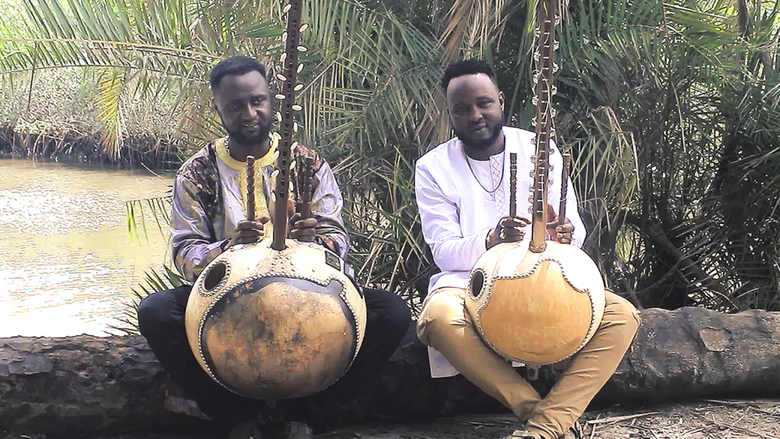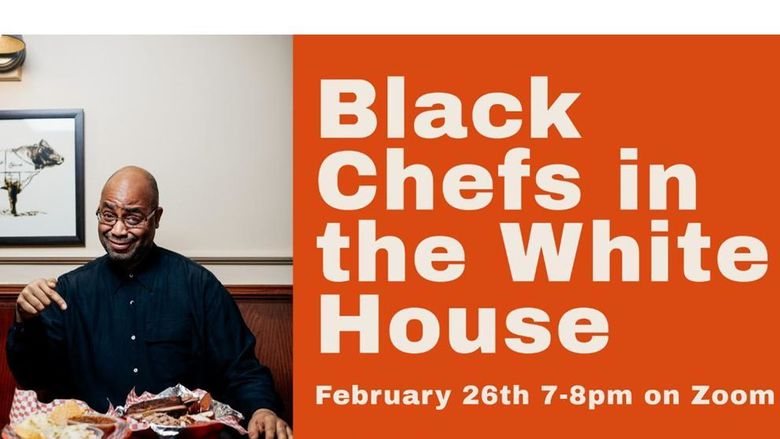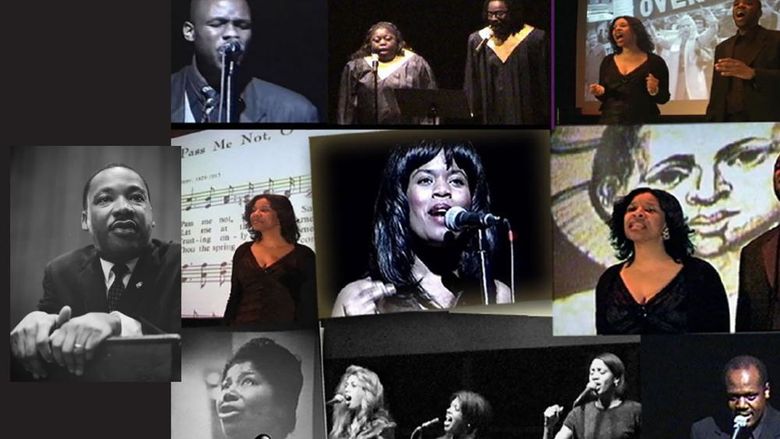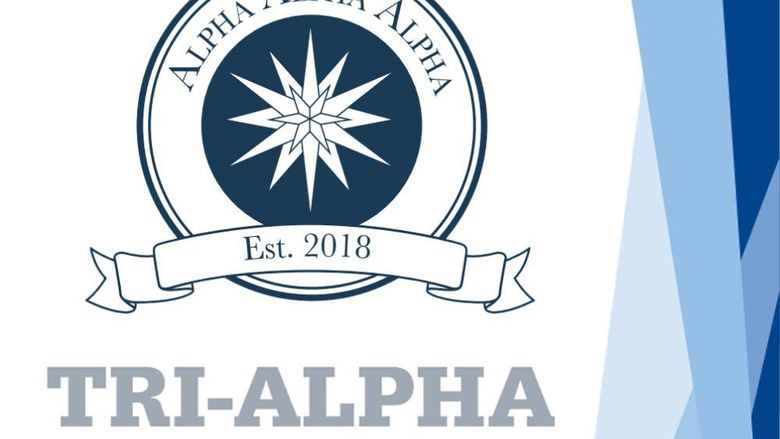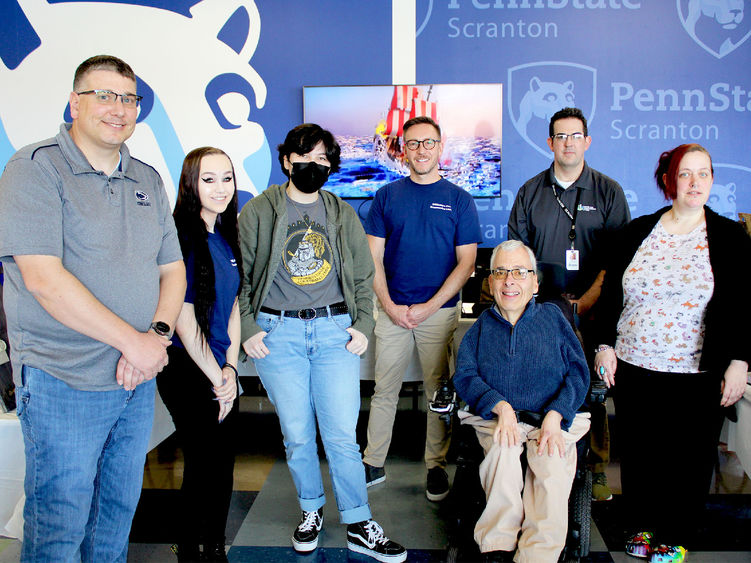
Participants in the recent Project ABLE event at Penn State Scranton hosted by the campus' DREAMers Club and Student Disabilities Services included, from left: Jayson Zimmerman, DREAMers Club treasurer; Liv Damski, DREAMers Club vice president; Rowan Mulligan, DREAMers Club member; Matthew Smith, campus disability and learning services specialist; Keith Williams, manager of Independent Living Services at MyCIL; Keith Loughney, outreach coordinator at MyCIL; and Lindsey Powers, Project ABLE assistant.
DUNMORE, Pa. — Penn State Scranton’s DREAMers Club and Student Disability Services hosted "Project Acceptance By Learning Experience," or Project ABLE, an activity-based learning event that provides opportunities to students to understand what it is like to live with various disabilities.
The program was organized by My Center for Independent Living (MyCIL), an organization based in Scranton, which has been providing help for people with disabilities to live independently since 1988. It offers five core independent-living services and coordinated service plans to 10 counties in Northeast Pennsylvania.
The DREAMers Club (Disability Rights, Education Advocacy, and Mentoring), which originated in Fall 2022, is a collaborative ally club consisting of students with and without disabilities whose purpose is to raise awareness and lower stigma surrounding disabilities.
The Project ABLE event enabled participants to increase their knowledge and experience with various disabilities by setting up a series of stations that simulated particular disabilities. Participants progressed through each one to learn about and become sensitized to some of the barriers encountered by persons with disabilities. Participants experienced simulated disabilities in the areas of mobility loss; manual dexterity challenges; visual disabilities; and learning differences.
Keith Williams, manager of Independent Living Services at MyCIL, said that Project ABLE has been coming to Penn State Scranton regularly for over 10 years.
“Our hope is to help sensitize and make people aware of what it’s like to have various disabilities. I think it’s important to note, after people are done completing the exercises, we are not looking for sympathy, we’re looking for empathy, for awareness, to understand,” Williams said.
MyCIL Outreach Coordinator Keith Loughney said, about students at Penn State Scranton: “These students are our next leaders, so instilling that mentality in them will help them as they go out in the community to advocate for this population.”
Another issue Project ABLE addresses is the tendency for some people to think that if they cannot see a disability, then it’s not there, said Loughney and Williams, who make sure to offer exercises surrounding "invisible" disabilities as well, such as dyslexia.
“It’s very important,” Loughney said. “At our Center for Independent Living, you may walk in and see a few people with physical disabilities, but at least 51% of them have some sort of disability.”
Additionally, mental illness, while often invisible, is considered a disability, said Loughney.
“Mental illness can be very severe and debilitating, which limits one’s quality of life, so it’s important to bring awareness to these types of invisible disabilities as well,” Loughney said.
Disabilities do not discriminate
“Disability is one phenomenon that doesn’t discriminate — it can cut across any gender, socioeconomic, race and national origin, and it can happen in a heartbeat,” Williams said. “Colleges, universities, high schools, businesses, post offices, government agencies and all buildings across the board, need to work through these barriers to help make facilities as accessible as possible.”
The Center for Independent Living supports services and advocates for buildings, parking lots and other spaces to be more accessible for all kinds of needs.
“When we push for more services, we want people to understand why,” Williams said.
DREAMers Club builds a community for those with and without disabilities
Disability and Learning Services Specialist Matthew Smith, said that Project ABLE was a perfect fit for the DREAMers Club, as its whole purpose as a club is to raise awareness.
“That is exactly what this project does. I believe that the exercises they offer, such as trying to unlock a door with a glove and learning what a disability is like, is education,” Smith said. “I think if we can create that understanding, then we can achieve our goal to lower the stigma that there’s something negative involved with having a disability.”
Members of the DREAMers Club said they relished the opportunity to host Project ABLE this semester and to give their fellow classmates a wider perspective of what some people around them may be living through.
“Disabilities can affect anybody, whether you were born with it or whether it starts later in life; it is so important to understand how inaccessible a wide majority of our society is. There is such a large community among fellow disabled people and so much information you can find about what’s inflicting you from people who have the same thing,”—Rowan Mulligan , DREAMers Club member
Adult transfer student and treasurer for the DREAMers Club, Jayson Zimmerman, said having Project ABLE on campus was very encouraging.
“Project ABLE provided a variety of different ways to represent individual disabilities across the spectrum — from mechanical, to writing, and mobility and visual disabilities,” Zimmerman said. “All of these different things show different ways for students to appreciate that ‘Hey, maybe something that I have isn’t something that I should be so afraid to talk about,’ — that we’re actually providing them with a venue, so they don’t have to have a stigma or be afraid of disabilities.”
Ask for help
Smith finds that oftentimes, people might not disclose they have a disability because they want to avoid the negative stigma that surrounds it.
“Stigma can cause persons with disabilities to not ask for help, especially from non-parents, and it can make a significant difference in their college academic experience. If we can normalize the presence and experiences of disabilities, we might open the door, literally, to more students feeling comfortable to seek assistance on campus.”
Loughney and Williams believe that when people make it known it's okay to ask for help, it gives others the opportunity to be open and discuss their disability.
“There’s no shame in asking for help,” Williams said. “Once one person asks for help, I think it can have a domino effect on others who aren’t quite ready to ask for assistance.”—Keith Williams , manager of Independent Living Services at the Center for Independent Living
“A huge percentage of people with disabilities across our population. They shouldn’t be fearful or have any stigma about reaching out for help because we offer a lot of services,” Loughney said. “Really being able to with people with disabilities can greatly improve their life to live as independently as possible.”
Liv Damski, vice president of DREAMers, encourages all students to join the club to support its allying efforts in continuing to raise awareness about disabilities and lower the stigma around them.
“We welcome anybody into our club,” Damski said. “Both students with and without disabilities.”
Limb Loss Awareness Month on campus
Each year, the month of April is observed as Limb Loss and Limb Difference Awareness Month, which raises awareness and honors the millions of people living with limb loss throughout the world.
Zimmerman, who lost his both of his legs while deployed in Afghanistan, understands the challenges the loss of a limb presents, not only with obvious physical loss, but also the loss of function, self-image, career, and relationships, he said.
“While my limb losses of both legs were the result of traumatic injuries sustained in combat in Afghanistan, much more occurs as a result of some type of illness or health complications,” Zimmerman said. “I just hope that when people see me on campus, they won't be afraid of my limb differences, but instead know that I'm just Jayson, and I'm just like everyone else here.”
Limb loss has not stopped Zimmerman from being involved in activities both on and off campus, nor in pursuing his dream of becoming a nurse.
Contact disability liaisons for help
Need an accommodation or want to learn more about disability services? Be sure to visit Penn State Scranton’s Student Disability Resources to connect with disability liaisons.

